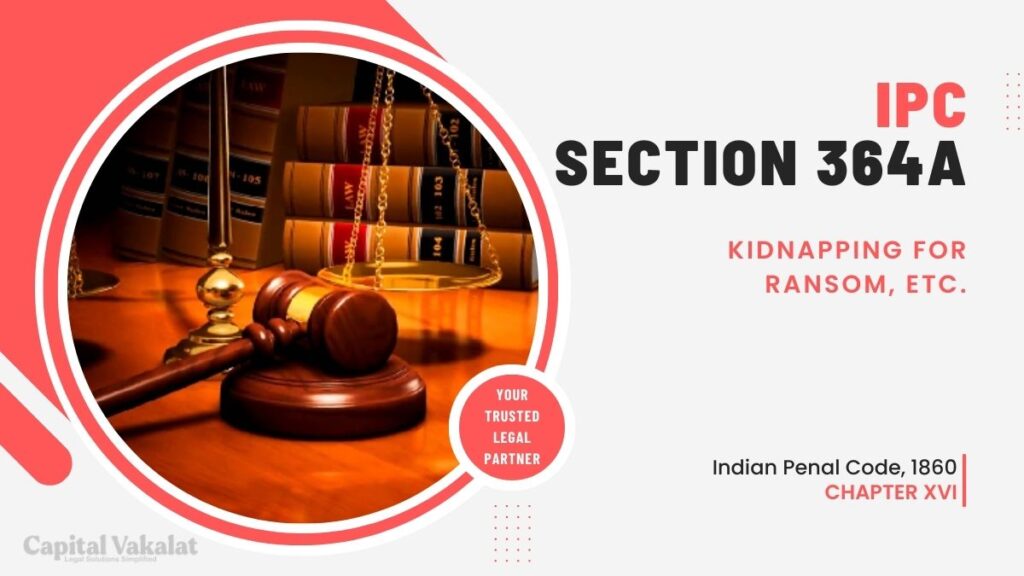Kidnapping for ransom is a grave criminal offense that strikes at the heart of personal safety and societal well-being. In India, Section 364A of the Indian Penal Code (IPC) addresses this heinous act, imposing stringent penalties on those who engage in such activities. Let’s delve into the intricacies of Section 364A, exploring its elements, legal consequences, historical context, and the challenges faced in its enforcement.

In the realm of criminal law, Section 364A IPC stands as a sentinel against the menacing crime of kidnapping for ransom. Kidnapping, as a standalone offense, already instills fear and insecurity, but when coupled with the motive of extracting ransom, the stakes are raised significantly. The introduction will provide a clear definition of Section 364A and underscore its significance in the legal landscape.
Elements of Section 364A IPC
Understanding the core elements of Section 364A is crucial for grasping the severity of the offense. This section not only defines what constitutes kidnapping for ransom but also delineates the key components that the prosecution must establish. We will break down these elements, analyzing the intricacies of “Kidnapping for ransom, etc.”
Legal Consequences
A comprehensive examination of the legal consequences associated with Section 364A is imperative. Penalties for violating this section can be severe, and we’ll explore the nuances of these consequences. Additionally, delving into judicial interpretations and landmark cases will provide insights into the evolving jurisprudence surrounding kidnapping for ransom.
Evolution of Kidnapping Laws in India
To contextualize Section 364A, it’s essential to trace the historical evolution of kidnapping laws in India. Examining how these laws have changed over the years sheds light on the legislative intent and societal response to the growing threat of kidnapping.
Challenges in Prosecution
Despite the legal framework in place, prosecuting cases under Section 364A poses its own set of challenges. We’ll delve into the burden of proof faced by prosecutors and the inherent issues encountered during investigations and trials.
Global Perspectives on Kidnapping for Ransom
Taking a broader view, we’ll compare India’s approach to kidnapping for ransom with international standards. Understanding how other countries combat such crimes provides valuable insights into potential improvements in the Indian legal framework.
Preventive Measures
The fight against kidnapping for ransom is not solely confined to the courtroom. Law enforcement agencies play a pivotal role, but public awareness and education are equally important. This section will explore the preventive measures that can be implemented to curb such crimes.
Media Influence on Kidnapping Cases
The media often plays a significant role in shaping public perception of kidnapping cases. We’ll examine the ethical considerations surrounding media coverage and its potential impact on legal proceedings.
Conclusion
In conclusion, we’ll recap the key points discussed throughout the article. Emphasizing the gravity of kidnapping for ransom, we’ll call for a collective approach involving legal authorities, law enforcement, and the public to combat this menace effectively.
Frequently Asked Questions
How has Section 364A evolved over time?
Section 364A has undergone amendments and changes over the years to adapt to the evolving nature of kidnapping crimes, reflecting the legislature’s commitment to addressing emerging challenges.
What are the common challenges faced in prosecuting cases under Section 364A?
Challenges in prosecution include the burden of proof, issues in evidence collection, and the complex nature of proving motive in kidnapping for ransom cases.
Are there international efforts to combat kidnapping for ransom?
Yes, various international organizations and initiatives are dedicated to combating kidnapping for ransom, fostering collaboration among countries to address this transnational crime.
How does media coverage impact kidnapping cases and legal proceedings?
Media coverage can influence public perception, impact ongoing investigations, and raise ethical concerns. Balancing the need for public awareness with the preservation of legal integrity is crucial.